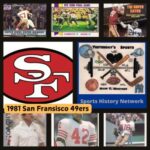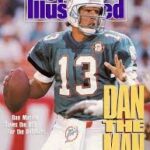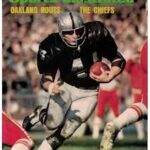Every dedicated baseball fan knows that the New York Yankees dominated Major League Baseball from 1921 to 1964, winning 29 pennants and 20 World Series titles. However, that dominance abruptly ended from 1965 to 1969. During those five years, the Yankees had only one winning season, and even that was just barely, finishing with an 83-79 record in 1968.
They finished the 1969 season with a record of 80–81, so hopes weren’t high for 1970. However, the Yankees had some promising young players. Left fielder Roy White was starting his sixth season. Shortstop Gene Michael, who was not a strong hitter but was an excellent defender, was entering his fifth season. Power-hitting centerfielder Bobby Murcer, who was only 24, hit 26 home runs in 1969 after missing two full seasons due to military service. Catcher Thurman Munson played in only 26 games in 1969 but showed great potential.
The two aces of the pitching staff were Fritz Peterson, beginning his fifth season, and Mel Stottlemyre, entering his seventh. The Yankees also had a good manager in Ralph Houk, who helped lead the team to three pennants in a row and two World Series titles from 1961 to 1963.
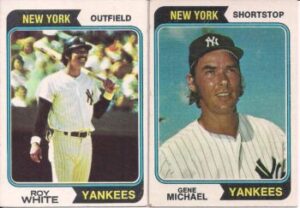
1970 New York Yankees
In 1970, I was eight years old. I played Little League Baseball and became a big fan of the New York Yankees. My father and older brother were Yankees fans, and we lived only about 20 miles from ‘The House That Ruth Built.’
The 1970 season got off to a rough start. By the end of April, the Yankees were 9–12, including being swept in a three-game series against the Red Sox. However, the team bounced back and kicked off May with a four-game sweep of the Brewers. By the end of May, their record was 26–23.
The Yankees began June by winning 11 of 12 games before finally cooling off. By the end of the month, their record was 43–30, just three games behind the division-leading Orioles. This hot streak included sweeping the KC Royals twice.
Unfortunately, the team couldn’t keep it going. From June 30th to July 26th, the Yankees lost 17 of 25 games and fell ten games behind the Orioles. The All-Star game was played on July 14, and three Yankees players made the team: Roy White, Fritz Peterson, and Mel Stottlemyre.
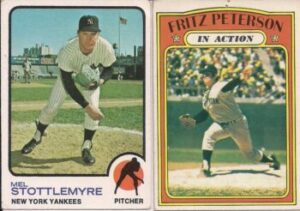
The Yankees got back on track, winning 18 of 31 games in August, but if they wanted any chance at catching Baltimore, they would need to keep winning and hope the Orioles hit a bad losing streak.
The Bronx Bombers started September by winning 7 of 8 games, boosting their record to 81–60, but they still trailed the Orioles by nine games. They then lost five consecutive games, two of them to Baltimore, and suddenly, they were 14 games behind in the standings. With only 16 games remaining, the Yankees’ hopes of catching the Orioles were gone. They finished strong by winning 12 of their last 16 games, ending the season with a 93–69 record.
Despite finishing fifteen games behind Baltimore, the Yankees had much to be proud of. In 1970, there were 24 teams in Major League Baseball, and the Yankees had the fourth-best record. In today’s game, a 93–69 record would likely qualify for the postseason. In 1970, only two teams from each league made it to the postseason, and before 1969, only one team from each league qualified, with no playoffs held — only the World Series.
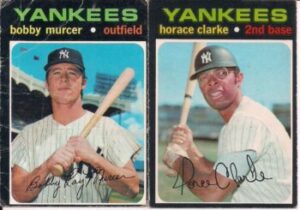
The Orioles’ 108–54 record was the best in the majors, and they went on to win the World Series. The Yankees’ 93–69 record was their best during their lean years from 1965 to 1975. They were unlucky enough to be in the same division as the top team in baseball.
Out of the eleven teams the Yankees faced this season, only the Orioles and Red Sox had winning records against them. Boston defeated them 10 out of 18 games, and Baltimore won 11 of 18.
The Yankees had four players who batted over .300. Backup rightfielder Jim Lyttle batted .310, while backup catcher Jake Gibbs batted .301. First baseman Danny Carter also batted .301, and starting catcher Thurman Munson hit .302. Munson also won the prestigious ‘Rookie of the Year’ award. Roy White led the team in RBIs with 94 and hit 22 home runs. Bobby Murcer led the team with 23 home runs. Fritz Peterson led the pitching staff with 20 wins and a 2.90 ERA.
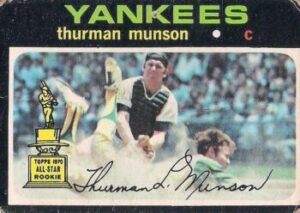
The Yankees were a .500 team for the next three seasons but had another strong year in 1974, finishing with an 89–73 record, just two games behind the first-place Orioles. Two years later, the Yankees won their first Pennant since 1964.
Please Consider Sharing If You Like This Article
Mark Morthier is the host of Yesterday’s Sports, a podcast dedicated to reliving memorable sports moments from his childhood days and beyond. He grew up in New Jersey just across from New York City, so many of his episodes revolve around the great sport’s teams of the 70s for the New York area.
He is also an author of No Nonsense, Old School Weight Training (Second Edition): A Guide for People with Limited Time and Running Wild: (Growing Up in the 1970s)

Check out Mark's Books Below
Please Note – As an Amazon Associate I earn from qualifying purchases
Resources
More From Yesterday's Sports
1981 San Fransisco 49ers: First Super Bowl Victory
The San Francisco 49ers franchise began in 1946 in the...
Read MoreMonday Night Football Early Years (1985 – 1991)
Before we jump into Monday Night Football from 1985 thru...
Read MoreMonday Night Football Early Years (1979 – 1984)
Before we jump into Monday Night Football from 1979 thru...
Read MoreMonday Night Football Early Years (1974 – 1978)
Before we jump into Monday Night Football from 1974 thru...
Read More


